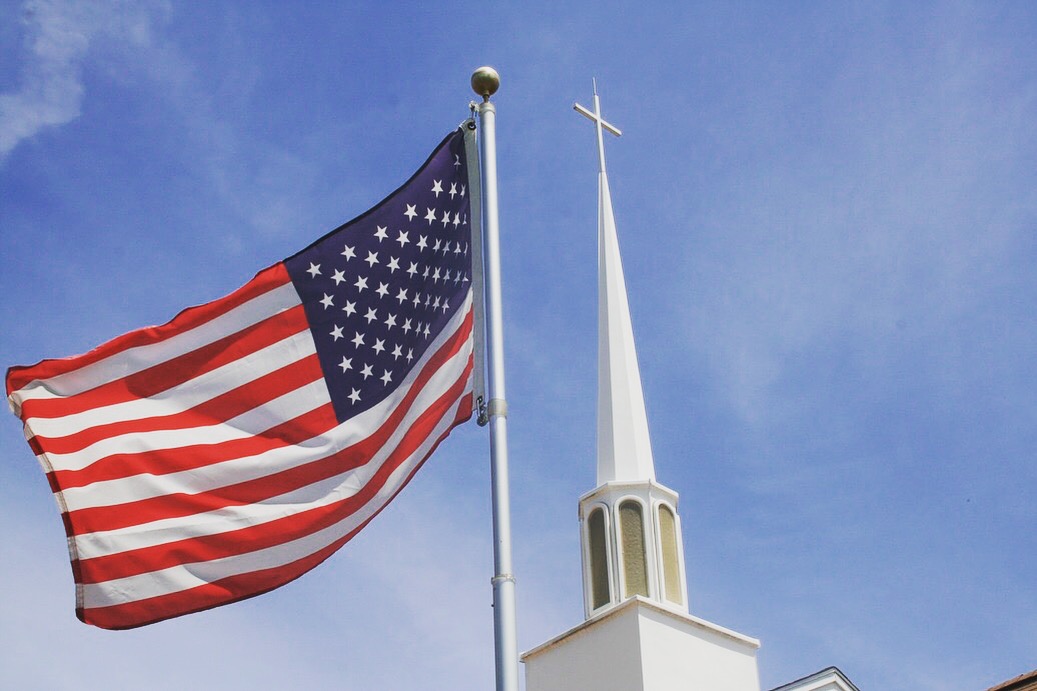![]()
Pastors confront identity versus idolatry during worship services as the influence of national pride seeps into the American church.
According to LifeWay Research, a research organization that works with churches to provide relevant insights, assessments and custom research, 53 percent of pastors agree that “our congregation sometimes seems to love America more than God.” Scott McConnell, executive director of LifeWay Research, said, “That is a sharp contrast to Jesus’ greatest commandment to love God with all one’s heart, soul and mind.”
A common occurrence in churches across America is children pledging allegiance to the American flag, the Christian flag, and the Bible. Sarah Choate, sophomore Intercultural Studies and music double major, sees this moment as potentially dangerous for the mission of the church.
“This means that all these little kids are pledging to be American, right alongside their commitment to the church and to Christ. That says a lot about how important people think American citizenship is,” Choate said. “I don’t think it should be that important – the country I identify with most can change, but my commitment to Christ should never change. The two should not be equated in importance.”
Choate’s concern about patriotism stems from the current refugee crisis and her experiences in Dr. Amanda Arrington’s courses. “Isn’t the church supposed to be a place where we can break down barriers and dissolve differences and come together as one? What does this mean for a church who wants to welcome refugees and foreigners if part of their customs involves strong patriotism … The church is a place where we come to reaffirm our identity in Christ. It can be distracting to have an assertion of Americanness thrown in there,” Choate said.
Terry Butler, associate pastor at New Life Church in Siloam Springs, Arkansas, sees politics as a growing competent in celebrating patriotism. “It isn’t uncommon anymore to hear political polarizing messages that are meant to inspire and influence voters. Living in the south, I feel like we see this primarily with a conservative agenda. However, I have also seen this with churches who lean more to a liberal agenda. Each is trying to define which is more ‘American,’” Butler said.
“While we should consider it a blessing to live in a country that has given us religious freedom, we must never honor it more than we honor God’s kingdom which incorporates nations from every part of the world,” Butler said. “If we aren’t careful, having an ‘America first’ mindset might cause us to lose empathy for our brothers and sisters in Christ who live in countries we deem ‘evil’, such as North Korea or Iran.
“It also hurts our ability to fulfill the great commission of Jesus who said to go into those places and make disciples. Why, if I feel superior to them, would I feel the need to experience great sacrifice in order to bring them the gospel? That only happens when we have a greater love for all humanity,” Butler said.
Daniel Bennett, assistant professor of political science, points to a study on Christian nationalism conducted by Andrew Whitehead, a sociologist at Clemson University: “After you account for political party, ideology, race, church attendance, the one thing that predicts people’s support for Donald Trump is Christian nationalism, this idea that we are an inherently Christian nation and something that President Trump was fighting to redeem is what that means in the 21st century,” Bennett said.
The concept of Christian nationalism bleeds religious affiliation into the political sphere and can cause Christians to lose sight of their identity, said Bennet. “If we find our faith lining up very easily with our political identity, that’s problematic because our faith supersedes and, in some sense, should challenge all of our identities. It should make us uncomfortable in many respects as citizens of those two kingdoms,” he said. “There’s going to be tensions. There should be tensions.”
However, Bennett believes that the church should encourage Christians to be politically and patriotically engaged. “Motivation to be engaged civically has a place in the church because we’re called to be in the world but not of the world,” Bennett said. “It’s an easy slip to go from that to then almost make patriotism an idol of sorts or to make worship of the United States an idol alongside the gospel … God calls us to be engaged in the world. That’s very different from being blindly patriotic.”
As a pastor’s kid, John Flaugh, sophomore construction management major, has seen patriotism in many different forms ranging from simply praying for the country to joining the armed forces.
“As Christians, we have a mission you spread the gospel and to further his kingdom. Some do this by preaching, some by praying, and some by serving in political positions,” Flaugh said. “Through our political system, it is possible to do the Lord’s work.”
Ed Vitagliano, executive president of the American Family Association, views healthy patriotism as an outer ring that begins with the family as the center, fulfilling the calling of Christians to love another, he said in an interview with AFA’s The Stand: “The Bible makes clear that love for the people that make up someone’s nation is just as normal and natural as love for family. David showed concern for the spiritual life of his countrymen, whom he calls ‘my people,’” Vitagliano said. “We are on solid biblical ground to assert that it is normal, natural and pleasing to God that we love our country and the people in it and that we seek the benefit of those who live in it.”
However, Vitagliano asserts that this godly love should go beyond a nation’s borders. “Certainly, this includes the preaching of the gospel in obedience to the Great Commission, but wouldn’t it also include giving aid to work that meets physical needs as well?” Vitagliano said.
“It would be strange to hear a Christian insist that we should not love our country, as it becomes clear in the New Testament that the love that characterizes the life of the Christian is not to have limits. That limitless circle would, by definition, include our nation—and beyond.”
Examining the Colin Kaepernick controversy over the national anthem, Bennett recognizes the voices of minority Christians that are often criticized by majority white evangelical Christians. “Christians should be trying to see this … through God’s eyes. How would God, on his throne, be seeing the totality of these circumstances? It’s never as simple as we want it to be,” Bennett said. “I don’t think we should be uncomfortable singing the national anthem or going to a parade on the Fourth of July or being patriotic. That’s perfectly acceptable in the context of our American identity, but we have to keep American identity secondary to our identity in Christ.”
Flaugh believes patriotism’s place in the church is ultimately a balance of allegiances. “The line that separates identity and idolatry at times can be thin but the easiest way to tell the difference is if you are giving up your beliefs as a Christian to be seen as an American,” Flaugh said. “I am a Christian first, but I still deeply love my country. If my nation told me to choose between one or the other, I would have to choose my God.”





